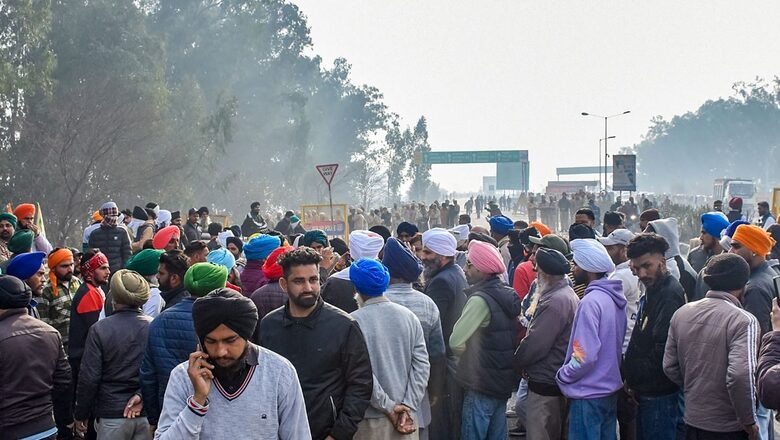
views
Farmers are heading towards Delhi after last night’s talks with Union ministers remained inconclusive as the former pointed out the lack of clarity on legal guarantees on the minimum support price (MSP). The government, however, said a consensus has been reached on most of the issues, and a committee will be set up to look into other matters.
Union agriculture minister Arjun Munda, who along with food and consumer affairs minister Piyush Goyal attended the second round of talks with the farmer leaders on February 11, said, “We are still hopeful that farmer bodies will hold talks…. We will try to resolve issues in the coming days".
Let us look at the list of demands made by the farmer unions:
The farmers have a 12-point agenda for a law to guarantee MSP for all crops, and setting of crop prices as per the recommendations of Swaminathan Commission’s report. Other demands include:
1. Full debt waiver for farmers and labourers;
2. Implementation of the Land Acquisition Act of 2013, with provisions for written consent from farmers before acquisition, and compensation at four times the collector rate;
3. Punishment for the perpetrators of the October 2021 Lakhimpur Kheri killings;
4. India should withdraw from the World Trade Organization (WTO) and freeze all free trade agreements;
5. Pensions for farmers and farm labourers.
6. Compensation for farmers who died during the Delhi protest, including a job for one family member.
7. Electricity Amendment Bill 2020 should be scrapped;
8. 200 (instead of 100) days’ employment under MGNREGA per year, daily wage of Rs 700, and scheme should be linked with farming;
9. Strict penalties and fines on companies producing fake seeds, pesticides, fertilisers; improvements in seed quality;
10. National commission for spices such as chili and turmeric;
11. Ensure rights of indigenous peoples over water, forests, and land.
What is the Government Saying?
Kisan Mazdoor Morcha (KMM) and Samyukt Kisan Morcha (SKM) had sent the list of demands to the Union ministers on February 6, and minister Arjun Munda, Piyush Goyal and Nityanand Rai went to Chandigarh to hold first round of talks with the farmers on February 8. The meeting was coordinated by Punjab chief minister Bhagwant Mann.
In the second round of talks, where 26 farmer leaders and three ministers met on Monday, the Centre agreed to withdraw cases against the farmers from the 2020-21 agitation, but couldn’t reach a consensus on the MSP. An understanding was also reached to compensate the families of the deceased farmers from the previous protests.
The government has also proposed to form a committee to deliberate on the legal guarantee for MSP, debt waivers and implementation of the recommendations of Swaminathan Commission.
MSP and Farmers
* The Narendra Modi government has spent nearly Rs 2.28 lakh crore in 2022-23 to procure food grains at MSP, up nearly 115% from 2014-15 when it had spent Rs 1.06 lakh crore on buying crops at MSP;
* The MSP-based procurement of food grains has also increased from 761.40 lakh metric tonnes in 2014-15 to 1062.69 lakh metric tonnes in 2022-23;
* The MSP in 2023-24 for paddy stands at Rs 2,183 per quintal, up Rs 243 from 2021-22;
* The MSP for wheat in this financial year stands at Rs 2,275, up Rs 250 from two years ago;
* The MSP for Jowar has risen by Rs 442 over the last two years, Rs 469 for Ragi; MSP for cotton has increased by Rs 894 to Rs 6,620 per quintal in the current financial year
Who are the Main Stakeholders This Time?
Contrary to 2020-21, the farmers’ protest is being spearheaded by Kisan Mazdoor Morcha, which owes allegiance to 100 unions, and the Samyukta Kisan Morcha (SKM), a platform for 150 unions, who are coordinating the Delhi march from Punjab.
KMM was formed by Sarwan Singh Pandher, convenor of Punjab-based union Kisan Mazdoor Sangharsh Committee (KMSC). KMM did not join the 2020-21 protest against farm laws in Delhi.
SKM (non-political), which broke away from the original SKM in July 2022, is coordinating the agitation under the leadership of Jagjit Singh Dallewal, president of Punjab-based Bharatiya Kisan Union Sindhupur farm union.
Delhi has been turned into a fortress this time, with barricades, nails and heavy equipment deployed to prevent farmers from entering the national capital. Rajasthan has sealed its borders with Punjab and Haryana on February 11, and imposed Section 144 in Sri Ganganagar and Hanumangarh districts. The Haryana government has sealed its borders with Punjab, and erected barricades on National Highway 1 leading to Delhi. Internet has been suspended in several districts.




















Comments
0 comment